How to Treat Acne Without Stripping Your Skin
Acne is one of the most common skin concerns worldwide, affecting people of all ages. Whether it’s occasional breakouts or persistent acne, the desire to “dry it out” can lead to a damaging cycle. Harsh cleansers, over-exfoliation, and alcohol-heavy products might seem effective at first, but often leave your skin irritated, dehydrated, and even more prone to breakouts.
The key to truly treating acne lies in balance—clearing blemishes without compromising your skin’s natural barrier. In this post, we’ll walk you through how to treat acne gently, effectively, and sustainably, without stripping your skin in the process.
Understanding the Skin Barrier
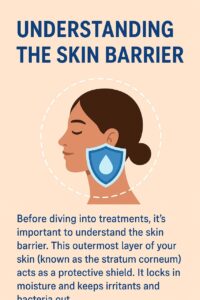
Before diving into treatments, it’s important to understand the skin barrier. This outermost layer of your skin (known as the stratum corneum) acts as a protective shield. It locks in moisture and keeps irritants and bacteria out.
When the skin barrier is damaged—often due to harsh products or aggressive routines—it can become dry, red, and inflamed. Ironically, this can lead to more breakouts. So, preserving this barrier is crucial while managing acne.
Step 1: Choose a Gentle, Non-Stripping Cleanser
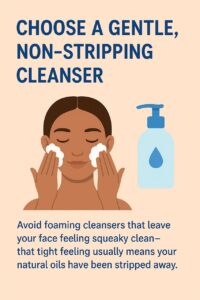
Avoid foaming cleansers that leave your face feeling squeaky clean—that tight feeling usually means your natural oils have been stripped away.
Look for:
• Gel or cream-based cleansers
• Fragrance-free or low-fragrance formulas
• Ingredients like glycerin or ceramides for hydration
Avoid:
• Sulfates
• Alcohol-based astringents
• Scrubby exfoliants
Recommended ingredients: Salicylic acid (in low concentrations) is great for acne-prone skin as it gently exfoliates inside the pores without irritating the skin barrier.
Step 2: Don’t Skip Moisturizer
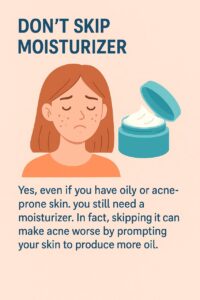
Yes, even if you have oily or acne-prone skin, you still need a moisturizer. In fact, skipping it can make acne worse by prompting your skin to produce more oil.
Choose:
• Lightweight, non-comedogenic moisturizers
• Gel-creams or oil-free formulas
Look for ingredients like:
• Hyaluronic acid for hydration
• Niacinamide for soothing inflammation and regulating oil
• Ceramides to strengthen the skin barrier
Step 3: Use Targeted Acne Treatments Sparingly
Spot treatments or acne medications can be helpful—but less is more.
Best active ingredients for gentle acne care:
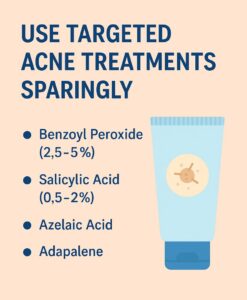
• Benzoyl Peroxide (2.5–5%) – Kills acne-causing bacteria, but can be drying; use only on affected areas.
• Salicylic Acid (0.5–2%) – Helps unclog pores and reduce inflammation.
• Azelaic Acid – Anti-inflammatory and brightening; effective yet gentle.
• Adapalene – A gentler form of retinoid available over-the-counter (start slowly: 2–3 times/week).
Tips:
• Introduce one active ingredient at a time.
• Always follow with moisturizer.
• Don’t layer too many actives at once—this increases irritation.
Step 4: Keep Exfoliation Minimal
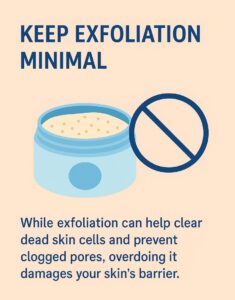
While exfoliation can help clear dead skin cells and prevent clogged pores, overdoing it damages your skin’s barrier.
Stick to chemical exfoliants like:
• Lactic acid (gentler than glycolic acid)
• Salicylic acid (BHA) – especially effective for oily skin
How often?
• Start with once a week, then gradually increase to 2–3 times if your skin tolerates it.
Avoid physical scrubs with harsh granules—they can cause microtears and worsen inflammation.
Step 5: Don’t Underestimate the Power of Sunscreen
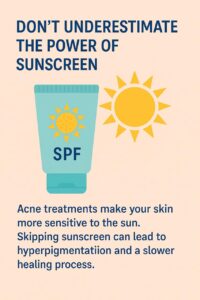
Acne treatments make your skin more sensitive to the sun. Skipping sunscreen can lead to hyperpigmentation and a slower healing process.
Choose:
• Oil-free, non-comedogenic formulas
• Mineral-based sunscreens (zinc oxide or titanium dioxide) if you have sensitive or reactive skin
Bonus: Zinc oxide is naturally anti-inflammatory and calming for acne-prone skin.
Step 6: Support Your Skin From Within
Skincare isn’t just topical. Your lifestyle also plays a major role in how your skin behaves.
Healthy habits for acne-free skin:
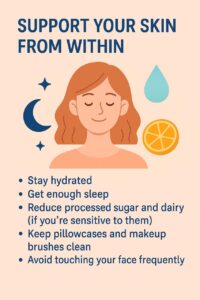
• Stay hydrated
• Get enough sleep
• Reduce processed sugar and dairy (if you’re sensitive to them)
• Keep pillowcases and makeup brushes clean
• Avoid touching your face frequently
Conclusion: Gentle Is Effective
You don’t need to wage war on your skin to fight acne. In fact, the best results often come from a calm, consistent routine that supports your skin’s natural defenses. Cleanse gently, hydrate properly, treat selectively, and protect daily.
Healing takes time—so be patient, listen to your skin, and treat it with the care it deserves.
